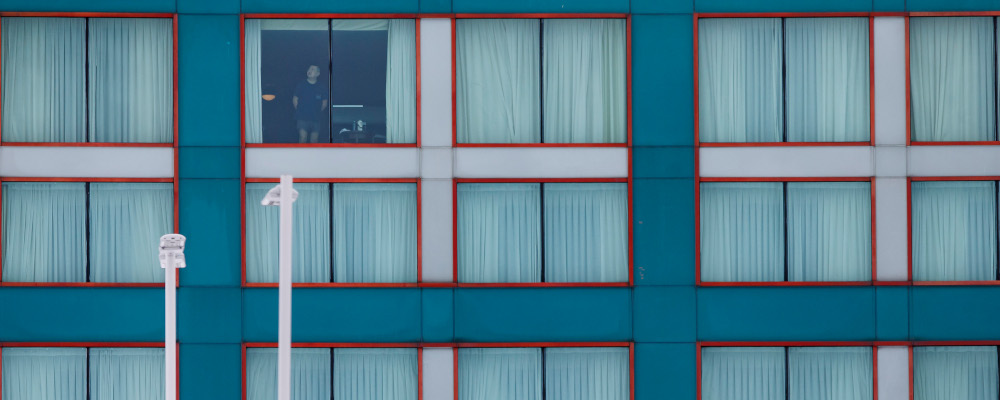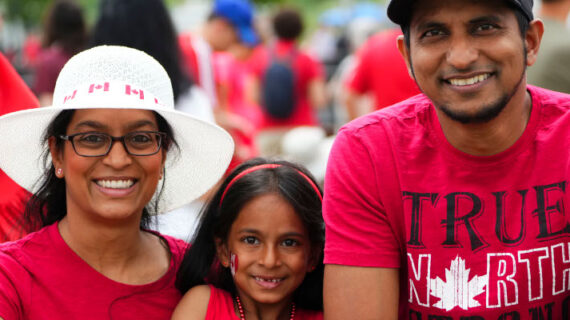The following is an edited excerpt from Joanna Baron and Christine Van Geyn’s newly released book, Pandemic Panic: How Canadian Government Responses to Covid-19 Changed Civil Liberties Forever.
When Kim Taylor’s mother passed away at her home in Kilbride, Newfoundland, on May 5, 2020 at the height of the first COVID-19 lockdown, Kim immediately began self-isolating in Nova Scotia, where she was living at the time. She also devised a plan that included staying in her parents’ basement, which had a separate back-door entry, to isolate upon her intended arrival in Newfoundland to enable her to safely attend her mother’s funeral. Kim even arranged with the funeral home director to schedule the funeral in the days after she had completed her fourteen-day quarantine.
Kim submitted an exemption form online requesting to enter Newfoundland and sent another follow-up later that day to ensure the request was received. She was determined to get to her mother’s funeral safely. However, on the 8th of May, the government denied her request.
“When someone dies, there are certain things of a time-sensitive nature, and my goal was to get to the province as soon as possible to get into isolation,” Kim told a CBC reporter at the time. To her astonishment, the next business day, Kim was denied entry into the province. Her mother would have to be buried by her father alone and she would not be able to bid farewell to her mother, whom she spoke to every day of her life.
On April 29, 2020, Newfoundland’s chief medical officer invoked the Public Health Protection and Promotion Act (PHPPA) to limit entry to Newfoundland and Labrador to residents, asymptomatic workers, and those in extenuating circumstances. The restrictions came into effect on May 4, 2020.
With the support of the Canadian Civil Liberties Association (CCLA), Kim launched a legal challenge against section 28(1)(h) of the PHPPA, asking the courts to declare it outside the legislative authority of the province, or, alternatively, to declare it of no force and effect under section 6 of the Charter, which protects freedom of movement. This would be one of the earliest legal challenges to a COVID-19 government restriction, and like many that followed, the court showed incredible deference to the government at the expense of the rights of citizens.
After a lengthy analysis, the court concluded that Taylor’s mobility rights under section 6(1) were engaged by the travel restrictions, which guarantees the right to “remain in Canada.” The judge interpreted section 6(1)’s guarantee of the right to “remain in” Canada as “the right of Canadian citizens to travel in Canada for lawful purposes across provincial and territorial boundaries,” which was engaged by Kim’s desire to enter Newfoundland to grieve her mother’s death.
Justice Burrage concluded that “While restrictions on personal travel may cause mental anguish to some, and certainly did so in the case of Ms. Taylor, the collective benefit to the population as a whole must prevail. COVID-19 is a virulent and potentially fatal disease. In the circumstances of this case Ms. Taylor’s Charter right to mobility must give way to the common good.” As we have seen, the amorphous appeal to what was necessary for the public interest not only allowed judges to neatly sidestep Charter rights but also to avoid engaging with the actual potential risks of the conduct in question: in this case, given Kim’s quarantine plan, her risk of spreading COVID-19 would seem to be negligible.
It’s important to note that the judge found that the border restrictions were justified under section 1 of the Charter, although other provinces were able to weather the first wave without such draconian measures, and less-intrusive options such as mandatory fourteen-day quarantines were available and workable.
Mobility rights are generally construed expansively. Section 6 is not subject to the section 33 notwithstanding clause. However, as we saw, the pandemic took a wrecking ball to this right’s construction. It wouldn’t be the last time. During the pandemic, we saw government responses, from interprovincial travel restrictions to quarantine hotels to federal travel bans, that all impacted the right to freedom of movement.
The quarantine hotel policy of the federal government was announced with short notice in early 2021. First, in early January the government announced that before their arrival in Canada, travellers would need to show negative results for approved COVID-19 PCR tests, in addition to existing rules requiring them to quarantine at home for fourteen days once they returned to Canada. A few weeks later, Prime Minister Trudeau went further and threw down a major gauntlet, announcing that arriving Canadians would soon be required to book and pay for “approved quarantine hotels.” Travellers would be responsible for the cost of a three-day stay, to the tune of about $2,000, including meals, as well as a second PCR test upon arriving in Canada. This announcement was made when many travellers were already abroad, creating mad chaos.
The direct justification for the hotel quarantine was puzzling from the get-go. For one, it was a three-day stay, unlike the brutal but at least logical fourteen-day hotel quarantines adopted in Australia and New Zealand. Travellers to Canada were instructed to wait in a government hotel for the results of their PCR test taken immediately upon arrival; with a negative result in hand, they were free to leave and complete a fourteen-day home quarantine. To add to the irrationality, individuals who tested positive would be permitted to leave the hotel to isolate at home if they had a satisfactory quarantine plan. Which begged the question, what was the point?
The CCF, along with five individual applicants, filed an urgent application on March 2, 2021 in the Ontario Superior Court seeking to have the quarantine hotel regulations struck down. The CCF and the five applicants were represented by lawyer Jonathan Roth who argued that the regulations were unconstitutional.
The stories of the individual applicants in the case were compelling. All were seeking to travel outside Canada for compassionate reasons: one, T.J. Radonjic, needed to travel from Vancouver to Washington state to assist his wife recovering from shoulder surgery, as she was unable to shower or cook on her own. Another, Yann Le Héritte, was seeking to travel to France to make end-of-life arrangements for her ninety-one-year-old mother with dementia.
The hearing was held in June 2021 and was attended by more than six hundred members of the public via Zoom—at one point, the virtual hearing was so full that the judge himself couldn’t get in to conduct the hearings. The CCF argued that the quarantine hotel rules violated the rights to movement (section 6), liberty and security of the person (section 7), and to be free from cruel and unusual punishment (section 12) and could not be saved under the reasonable limits clause, section 1. By June 2021, when the case was heard, the federal government’s own expert panel had recommended discontinuing the hotel program.
The government failed to proffer any concrete evidence on the justification for a three-day hotel quarantine, in addition to existing requirements for a negative test and a suitable home quarantine plan. The minister of health could only say that “the data was incomplete in terms of what combination of measures are needed” but that they hoped the hotel quarantine would provide “an extra layer of security for Canadians.” Less than two percent of cases in the country were connected to international travel at the time the measures were implemented.
There was a partial victory because of the litigation: on May 27, 2021, the federal government amended the rules to permit compassionate exemptions. The attorney general communicated this amendment to the CCF, requesting that we discontinue our litigation. We were eager, however, to make the constitutional arguments against the hotels on the merits and refused the government’s demand to discontinue.
But ultimately, a judge of the Ontario Superior Court dismissed both the CCF’s motion for urgent relief against the quarantine hotel regulations and the substantive challenge. He found that “the applicants’ wish to choose to quarantine at home, and their spending priorities when they travel abroad during the pandemic, are decidedly first world, economic problems…that barely raise any discernible constitutional concern.” In doing so, the judge ignored the compassionate need of the individuals to travel.

The judge also dismissed the opinion of the federal government’s own expert panel, opining that “the expert panel did not provide scientific truth to the government. Nor are its recommendations of constitutional force. They are important input for the government in making policy choices to formulate laws.” In other words, while the expert panel’s opinion was part of the basis of the government’s decisions, it was not binding in any way.
In retrospect, what did the quarantine hotels afford Canada? According to the government’s stated rationale of protecting the country from variants, not much. The U.K. B117 variant spread rapidly across the country in early 2021. British Columbia played host to the world’s worst outbreak of the Brazilian P1 variant, with over seven hundred confirmed cases (including the majority of the Vancouver Canucks hockey team). The multiple layers of what was essentially pandemic theatre, unsurprisingly, did not prove effective against seeding the variant.
The economic impact of the hotels, however, was well documented and staggering. In February of 2023, Public Health Canada reported spending in the amount of just under $389 million in less than three years on its designated quarantine facilities across the country. In one instance, documents showed that the government spent $6.8 million on one quarantine hotel in Calgary alone—which, it turned out, had housed and fed a total of fifteen people, amounting to an outlay of $450,000 per person, as highlighted by Calgary MP Michelle Rempel Garner. More than a year after the quarantine hotel program was discontinued, the contract with the Westin Calgary Hotel continued until October 30, 2022. And in fall 2023 a lawsuit was filed alleging that one of the quarantine hotel operators misappropriated $15.7 million in funds from the Public Health Agency of Canada meant to be used for hotel rooms, pocketing them for personal use.
In addition to freedom of movement, many other rights were impacted by government responses to COVID-19, and courts treated government violations of those rights with similar levels of deference. It is vital to remember the lessons from the pandemic and how rights were so easily bulldozed in the name of amorphous claims of public safety. COVID-19 is unlikely to be the last pandemic of our lifetime, and it certainly will not be the last crisis. We must learn from these lessons lest we repeat them.




